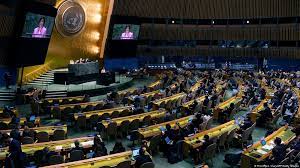
UN members endorse resolution to end the war in Ukraine

On the eve of the first anniversary of Russia’s invasion of Ukraine, roughly three-quarters of UN member states endorsed a resolution calling for “just and lasting” peace, calling for an end to the war and demanding that Russia leave Ukrainian territory.
The nonbinding resolution advocates for peace reaffirms support for Ukraine’s sovereignty and highlights the need for accountability for war crimes.
UN General Assembly members on 23/02/2023 voted in favour of a motion put forward by Germany calling for peace in Ukraine as soon as possible. China and India were among the major abstentions.
Details of the voting
In all, 141 countries voiced support for the resolution. Seven opposed it — Russia, Belarus, North Korea, Syria, Mali, Eritrea, and Nicaragua.
Another 32 countries abstained during the vote. China, India, South Africa, Pakistan, Sri Lanka, and much of Africa and Central Asia were among them.
The level of support was similar to comparable previous General Assembly votes relating to Russia’s invasion of Ukraine. Mali and Eritrea moved from abstaining to voting against the resolution; western hopes of potentially swaying India’s voice at the last were dashed.
South Sudan, however, moved from past abstentions on the conflict to voting in favour of the motion, with its delegate saying this was partly because of the country’s own recent legacy of civil war and the UN’s role in helping to defuse it.
General Assembly resolutions are not binding and carry mainly symbolic weight at the United Nations. However, unlike the Security Council, Russia cannot unilaterally veto them.
About the Draft Resolution
Along with calling on parties to the conflict and the international community to seek to broker peace, the resolution also calls for Russia to withdraw from Ukraine’s territory.
The document “reaffirms its commitment to the sovereignty, independence, unity and territorial integrity of Ukraine within its internationally recognized borders, extending to its territorial waters.”
The measure also “reiterates its demand that the Russian Federation immediately, completely and unconditionally withdraw all of its military forces from the territory of Ukraine within its internationally recognized borders, and calls for a cessation of hostilities.”
The resolution does not go into any details on how peace or peace negotiations might be achieved, short of saying through member states and international organizations “redoubling” their efforts.
It also calls for war crimes perpetrators to face international prosecution.
German Foreign Minister Annalena Baerbock said that “we do have a peace plan right here in front of us. It’s called the Charter of the United Nations. Its principles, which apply to every state, are very simple: sovereign equality, territorial integrity, and the non-use of force,”
Denmark’s Foreign Minister Lars Lokke Rasmussen spoke on behalf of all five Nordic countries, appealing for an immediate cessation of hostilities. “This war must end. The violence must end. We must restore respect for the UN Charter. And we must ensure that similar horrors do not happen again,” Rasmussen said.
In its contrast, Hungary’s Foreign Minister Peter Szijjarto, meanwhile, appeared to appeal to western countries to put more of their efforts into securing peace negotiations rather than either arming Ukraine or sanctioning Russia. He noted Hungary’s efforts to welcome refugees fleeing the war.
Hungary is a NATO and EU member that nevertheless maintains cordial ties with Russia.
In a similar tune, China’s deputy ambassador to the UN, Dai Bing, said that peace talks should be the international community’s priority. Echoing comments from China at the Munich Security Conference, Dai said that China regretted that initial negotiations between Kyiv and Moscow had stalled.
South Africa, another contentious abstainer in past votes, asked whether the past UN resolutions had sought to halt the fighting or rather to condemn Russia.
The 141 countries supporting Thursday’s motion equalled the tally voting in support of the first major General Assembly resolution condemning Russia’s invasion last March.
At another vote, in October 2022, 143 countries supported a motion condemning Russia’s unilateral declaration of having annexed Ukrainian regions after holding unrecognized referendums on joining Russia.
Russia’s UN ambassador Vasily Nebenzya called on members to oppose the motion, arguing it was one-sided. He also accused Ukraine’s NATO allies of exacerbating the conflict, claiming there were parallels to World War II.
The vote coincides with a flurry of diplomacy on all sides around the one-year anniversary of the war breaking out.








